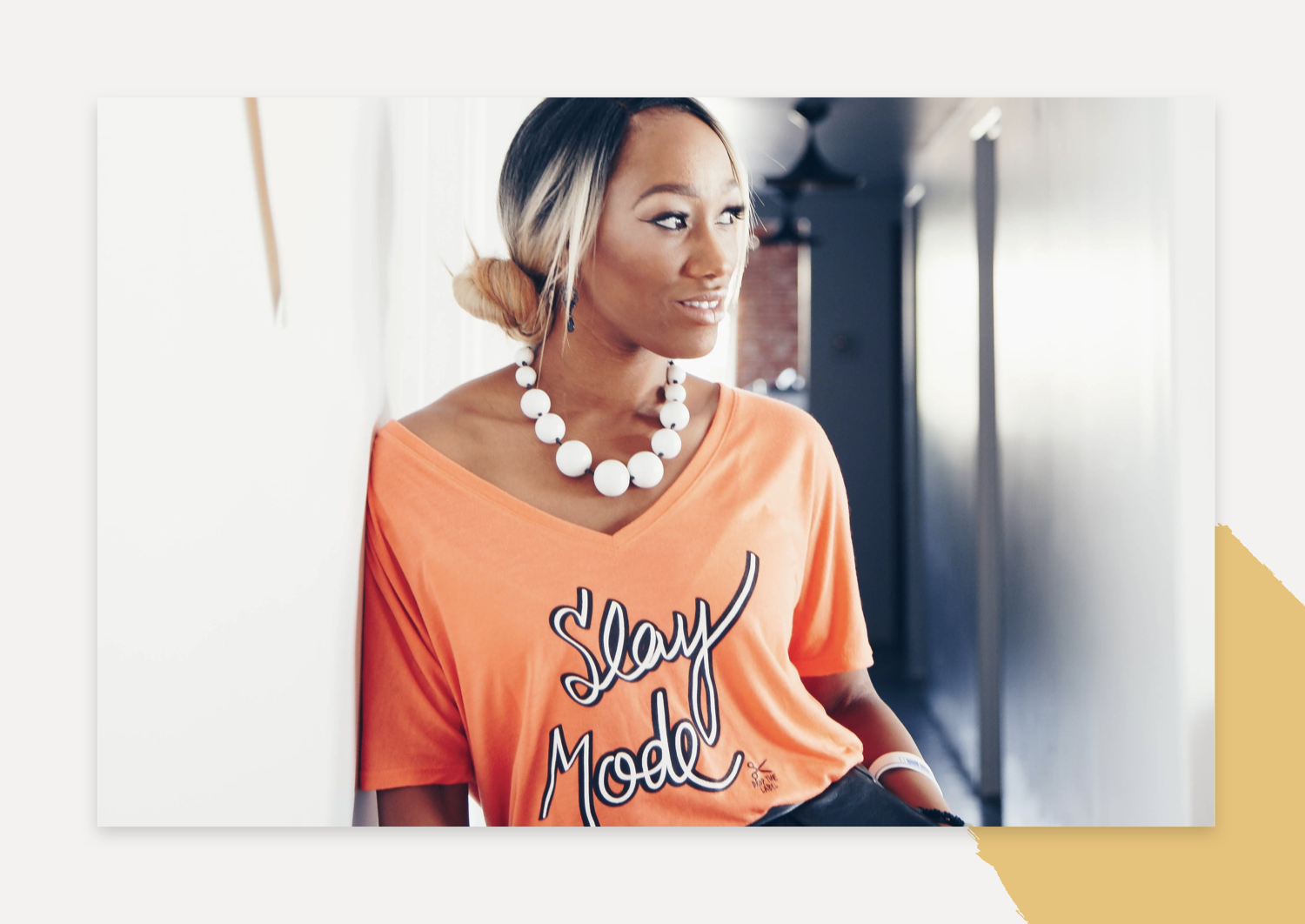Why it Feels So Weird When You Try and Sell (And How to Get Better at It)
Written by Margo Aaron
Why is it when we try to sell something, we become the MOST annoying version of ourselves?
The second we need to put ourselves out there, we go from this confident awesome human to a profoundly irritating one. (Or, if you’re anything like me, you can’t shut up. smh.)
Self-promotion is awkward.
Especially, if you’re a good person. You don’t want to come off as annoying or pushy, but when you try and sell stuff it feels forced and unnatural.
The good news is there’s a better way to sell and self-promote that doesn’t feel so terrible.
Good sales makes people go “OMG THANK YOU!”
Like how you feel when Kate Spade does their 75% off sales. It’s not annoying if you love their purses. You’re like YES PLEASE PLEASE EMAIL ME AGAIN SO I REMEMBER TO SCOPE OUT THIS SALE AFTER MY MEETING AHHHHHHHH SO GOOD!!!
When you get sales right, your prospects respond with, “TAKE MY MONEY!”
First, we need to let go of what you think sales is:
Egocentric
Annoying
Awkward
Forced
Sleazy
It doesn’t have to be. I’m going to offer some recommendations for how you can stop feeling like you’re annoying and actually SELL with integrity and self-promote without feeling like a douche.
It’s not annoying when you’re the market.
The last 4 days, GAP sent me 3 emails a day.
That’s 12 emails. TWELVE.
But guess what happened? I bought $200 worth of clothes.
It took TWELVE emails to get me to spend $200. Each time I got an email, I thought, “Ahh, yes, I did want to buy that sweater!”
If they’d targeted my husband, however, he’d have been annoyed. Because he doesn’t want to buy that sweater. He’s not their market. Selling to the right market is the key to NOT being annoying. You never *really* have to sell if you find an audience wants what you have.
Now, GAP knew they were targeting the right person (me) because I’d:
Purchased before
Had GAP cash to spend
Put stuff in my cart, but abandoned the cart
They knew I was interested, but was either on the fence or (more likely) walked into a meeting and forgot.
We are busy people with real lives. If you don’t nudge someone, they’re going to forget. How many times have you *meant* to grab that cute soap on the way home from the office, but your boss texted you and then you started looking for your metrocard and then…
We need reminders. They’re helpful.
If GAP had been like, “Let’s not bother her today. Two emails this week is enough,” I would have never gotten all that juicy athleisure.
To the right market, your promotions are never annoying - they’re helpful.
Your customers are NOT your colleagues
Get those people out of your head. They’re not buying from you (this is true of your mom too). Often when we feel embarrassed or awkward about promoting ourselves, it’s because we’re thinking of who is judging us.
Consider this scenario: You have an AWESOME blog post you just published. You want to share it because it could be useful to others and, frankly, you’re proud of it. So you login to LinkedIn, ready to share it with the world when....WHAT. DO. YOU. WRITE??????
That blank status prompt is staring at you. The cursor is blinking.
So you begin...“Hey Guys, I’m so excited about this post I just wrote about blah blah I hope you share it! Thanks!”
Blehhhhhhhhhhhhhh boring.
You hit “send” and a few obligatory friends like it. But nothing really happens. It mostly gets crickets.
I will tell you why.
First off, you’re not excited. It’s just a blog post, calm down. Second off, it reeks of disingenuousness. Third, what incentive is there for the reader? Like why should I click??
What’s happening here is you’re thinking of your colleagues, not your customers. And you’re falling victim to the Overly Chipper Effect (the sudden urge to be REALLY EXCITED about the thing you’re selling), where you think you have to sound a certain way in order to promote. You’re trying too hard to fit in.
You’re mimicking what you see others do. And those others are your colleagues, NOT your customers.
Who you want to be thinking about are the people in your market. If you sell marketing services, for example, do NOT think about how all other marketers would write that post or what your friends at that other agency will think when they see this.
Think about your future clients. <— Those are your prospects.
And they don’t care that you’re “excited about this post!” They care that you can solve their problem. So speak to them directly about that problem.
“Marketing doesn’t have to be so confusing. We break down what you need to know in this post on….”
When you think about your target market (the people who want what you’re selling) and not your colleagues, you will have an easier time knowing what to say and how to say it.
Which brings us to the next thing:
Talk like a human
The Overly Chipper Effect (something I explain here) isn’t the only thing getting in the way of your selling authentically. You also believe you’re supposed to sound smart, professional, or whatever you saw someone do on TV.
The only ONLY ONLY ONLYYYYYY way to talk when you are trying to sell something is like a human.
Casually. Colloquially. Informally.
There are a few reasons for this. First, buyers need to trust you. And we trust other people who we judge as sincere and genuine. If you’re trying too hard to sound a certain way, like buttoned-up or overly-excited, your prospect is going to pick up on it. It’s going to come off as fake and it’s going to interfere with your ability to connect.
And if you cannot connect, you cannot get them to trust you.
Connection breeds trust.
The next reason you want to talk like a human is because you want to be clear. "Consulting speak” is confusing. And “corporate” talk requires a translator to understand. When you’re promoting or selling something you want to leave NO ROOM for ambiguity.
Which means you need to say what you mean.
“We’re an innovative firm that is dedicated to solving your problems with creative solutions” WTF Does this mean?
“We will build you a website on WordPress.”
“We make iphone apps for food companies”
“We create custom lamps for people with vision problems.”
Say what you mean. The best way to do that is to talk like a human. When it comes to sales, clear trumps clever every. day. of. the. week.
If your prospect is still confused after talking to you then you’re not talking like a human. The “hack” I like to use is thinking of my mom. Whenever I’m in front of a prospect or drafting a promotion, I think “Would my mom know what this means?” If the answer is no, I’m not talking like a human.
It feels personal, but it’s not.
Rejection sucksssss. Ask every 15 year old boy in the history of school dances. It never feels good, BUT you do get better. Yes, you get better at being rejected.
When you first start promoting your stuff, it feels SUPER personal for two reasons.
One: It’s your work (or product or service). So, when no one buys or shares it, it feels like they’re not buying or sharing you personally.
Two: You’re the one doing the selling. So when your sales pitch is rejected, it feels personal. YOUR pitch is rejected.
The good news is as much as you want to believe it’s your fault someone didn’t buy, odds are it isn’t. Yes, you can refine your pitch. Yes, you can learn the mechanics of persuasion, but more likely it was that they (a) didn’t want what you were selling and (b) the timing.
No one walks out of GAP and goes, “I’m not buying these jeans that fit perfectly because the dude at the register sucks.” You’re going to Tweet about how he was a dick and then you’re going to buy the damn jeans. Because FIT is more important (anyone who’s ever tried to buy jeans knows what I’m talking about).
Your buyers need the ability AND willingness to buy. (This is a lesson I learned from Ramit Sethi, called the Pay Certainty Technique). If your people don’t have the cash or don’t want the thing you’re selling (let’s say, they love your jeans but they don’t fit), it’s not happening.
People don’t buy things to be polite. They buy things they want.
Which brings us to our final point:
Know What Your People WANT
If I had a dollar for every time someone said, “but they NEED this!” I’d have 12 yachts by now. It doesn’t matter that your market needs the thing you’re selling or promoting. It matters that they want it.
Desire is what drives purchase decisions.
So your job as the “salesperson” is to channel their desire into the thing you’re selling or promoting.
It doesn’t have to be a deep desire, it just needs to be a desire. For example, if it’s 9PM and I am STARVING, then I probably want some food. Your job is to connect my desire for food to the food product your selling. Tell me how your product (for ex: burgers) solves my problem (it’s 9PM, I’m starving. Nothing is open. HELP ME!!)
If people do not WANT your product or service, then being good at sales and self-promotion won’t help you. This is the secret!!!
You can learn the techniques and tactics (which I recommend you do, they’re helpful), but they won’t save you if your market doesn’t want what you have.
It’s not sales, it’s advocacy
Most of us, if we have a conscience, still feel icky about “selling.” Even after reading this awesome and helpful article on why you shouldn’t feel icky about it.
So, I’ll offer one final reframe that helped me get more comfortable with putting myself out there and selling my stuff: It’s not sales, it’s advocacy.
Every time I share a blog post, sell a course, or promote something I’m proud of, I think of it as advocating for something I believe in - NOT forcing people to buy something they don’t want.
And for the record, that never works. You can’t make someone do something they don’t want to do. It’s like getting your lazy friend to go to the gym. It’s not happening. People only do what they want to do.
So, I think of myself as an advocate for the things they want. So, the challenge is to connect what they want to what I’m offering.
Connect what they want to what you’re offering.
A short cut for this is answering the question: Why should anyone care?
ALWAYS BE ANSWERING THAT QUESTION!
Then you’ll never feel like you’re selling. You’ll feel like you’re helping.
“It’s 9PM and you’re STARVING. I have a burger for you, just click here.”
Margo Aaron is a recovering academic and accidental marketer. To learn more about ethical selling, sign up for her free mini-course here.

